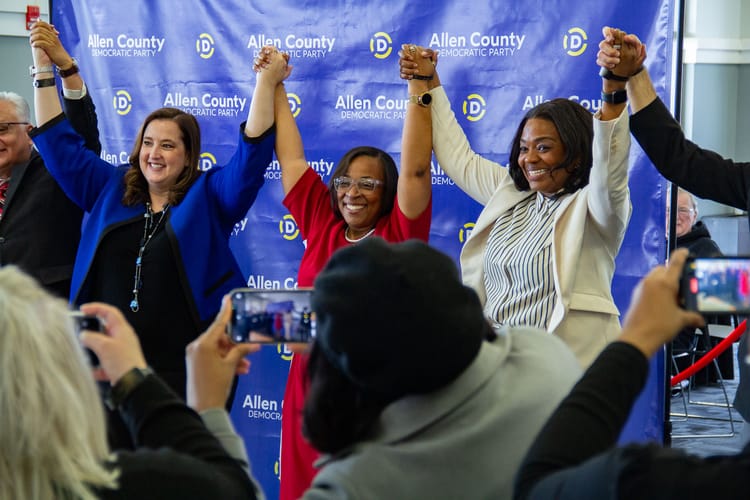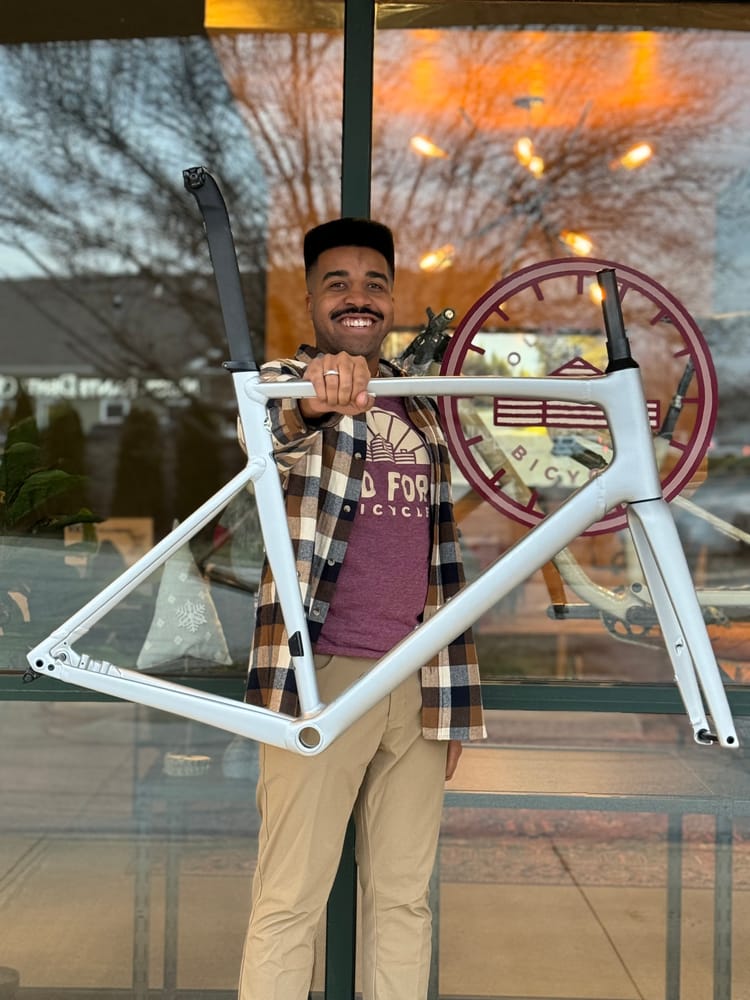What's next for Fort Wayne's NPR station 89.1 WBOI? Meet its new President & GM to share your ideas!

When Travis Pope was Station Manager at Marfa Public Radio in West Texas, he found a unique training ground in public broadcasting.
The station had a huge broadcast range about the size of South Carolina with a population of roughly 400,000 people who could tune in at any time. However, its office was in a small, artsy town of about 1,600.
“So, you had to program for a huge audience — some of it in two large cities — while living in this sort-of artist colony,” Pope says. “There was constantly a tension between news and arts, between curiosity and culture. I enjoyed it.”
Today, as the recently appointed President & General Manager of WBOI, Pope is getting to know Fort Wayne better so he might draw out a similar balance between news and culture that accurately reflects the breadth of the human experience here.
As part of the process, he’s hosting Community Engagement Hours at the Allen County Public Library Downtown and virtually, where you can meet with him and share your experience in Fort Wayne, as well as hopes for the local NPR station.
We sat down with Pope to learn more about his background and what’s next for 89.1 WBOI.
Tell us about your background and how you got into public media.
TP: I got into public media in 1996, listening to Virginia’s Home for Public Radio, VPM, in the car with my dad. We didn’t have a lot of money growing up, but it was a place I could get different perspectives, where the barrier to entry was low (no paywall), and I never stopped listening. Through all the other jobs I had, it was that one constant.
I was a technology reporter and writer for about five years. Eventually, I felt that tech wasn’t asking very interesting questions anymore, so I looked around, and I thought: I know where they are asking interesting questions: public media.
When I left VPM, I was the Program Director; I also worked as Traffic and Operations Coordinator and Producer there previously. Then I was Station Manager at Marfa Public Radio in West Texas.
What led you to Fort Wayne, and do you feel a similar push and pull here?
TP: I had never been to Fort Wayne before I interviewed for this job. Tim Roesler, WBOI’s Interim President and General Manager, and I had worked together previously. When the folks conducting the national search reached out, he told me I had to check it out. When I did, I saw an opportunity to create whatever comes next for public audio here in Fort Wayne. The ingredients are here, I think.
I think there can be a similar push and pull on public radio here, too. My job is to create a station that reflects the community it serves. I want us to sound like this community and question what it means to be a public radio station here. That’s how you get the best, most authentic sound.
If readers have ideas for the station or want to learn more, how can they meet you?
TP: You can go to WBOI.org, and there will be a button that says “Meet Travis: Community Engagement Hours” in the top right-hand corner. You’ll be able to select a time, and the meetings can be virtual or in person Monday-Friday from 2-3 p.m.
You can meet with me about anything and everything. What I’m looking for is as much context about Fort Wayne as possible. WBOI is this community’s station, I’m just being entrusted to run it. So, if there’s something you think I should know about news, music and culture in Fort Wayne, these sessions are an opportunity to tell me.
One of the conversations I’m very interested in having is what the programming mix between news, art and music is as well as opportunities to connect locally that we haven’t availed ourselves of yet.
Fort Wayne is known for its music scene. Have you discovered any local bands you enjoy yet?
TP: I attended a live recording of Meet the Music in March where Hey Hera, a jazz, R&B, and pop duo, performed. At some point, I almost forgot I was in front of a hot mic and a live camera. Bobcat Opossum also killed it.
Public broadcasting has a reputation for serious news, and certainly in the past couple years, during the pandemic, it had to be. But there’s also room for pure joy on public radio. You’ve got to be able to find it somewhere, and that’s what I hope we can provide with our music programming.
That’s powerful. Some of our favorite programs on NPR (nationally) give us that sense of joy you’re talking about. One that stands out is “Wait, Wait Don’t Tell Me,” the news gameshow that runs at 11 a.m. Saturdays on WBOI.
TP: It’s funny you say that because “Wait, Wait Don’t Tell Me” is one of the most popular shows on NPR nationally. “Car Talk” is another one that people often reference. They’re both examples of programmers realizing that: In some instances, their job is not just to inform, but to create a mood. That’s one of the things I want for WBOI. When you’re listening to news, I want you to feel informed, and therefore, feel empowered. And when you’re listening to the music and everything else our station offers, I want you to feel entertained.
Nationally, I think we got away from that during the pandemic, when it was news magazine, followed by news magazine, followed by news magazine. News is important, but what if we created audio for the whole person, instead of just the part of you that wants to be informed? We’re already doing some of that here at WBOI, but I think we can do a better job of telling people about it and listening to their ideas.
WBOI is a cultural institution in Fort Wayne that has been here for a long time, and my job, as I see it, is to make sure it’s still here for the next generation. These aren’t my airwaves; These are Fort Wayne’s airwaves. It’s your station, and it’s here because you support it and care about it.
How is WBOI doing financially? Does it still plan to move into a building Downtown eventually?
TP: We’re still crunching the numbers from our last fund drive, but we did very well, and the community support warmed a lot of hearts at the office.
WBOI decided not to move Downtown last year. The board wants to invest more in content and storytelling instead of a new physical space for now.
We loved WBOI’s former Issues & Ales events at local restaurants. Will there be a return to events like these in the future?
TP: We plan to return to engaging the community in ways they want to be engaged. But we’re still figuring out what exactly that will be.
Is there anything you can share yet about what’s next for WBOI’s future?
TP: I would say: During the next year, the focus is on being in the places that matter to our audience and covering the things that matter to them – whether it’s traditional broadcasting, improving our audio stream, making podcasts, publishing stories on our website or publishing newsletters.
I don’t believe that I run a public broadcasting station as much as I run an audio service. So I care that you listen, but I don’t care how you listen. Public media stations, for a very long time, said: We’re public media, come to us; what I would like to say is: We’ll come to you. For me, it’s about putting the things we do here in the places people want to access them, and if that’s your phone or the WBOI app, that’s great.
Tell us more about podcasts.
TP: Podcasts are a big goal for me at WBOI, simply because I recognize that one of public radio’s biggest concerns has to be engaging that next generation of listeners. It’s far easier for me to create a podcast people are likely to listen to than to expect them to turn on the radio, if that’s not part of their routine.
One of the lessons I learned from the tech world is: folks have their habits. Rather than fight their patterns, it’s much easier to embrace what it is they enjoy about a platform or distribution method than it is to expect them to change.
We recently added Northeast Indiana Now, hosted by Richard Sanchez, which is a podcast you can download. It offers daily news from the region and around the Hoosier state. We have a strong local reporting team with Ella Abbott and Tony Sandleben on staff. WBOI also has a strong anchor team, curating stories for all of our newscasts in responsible ways.
Anything we didn’t ask that you’d like people to know?
TP: I am in fact 35 years old, and not 12. I’m short; I get that question a lot.
Last question, just for fun: Any favorite local eateries so far?
TP: Coney Island. My apartment is on The Landing, and there’s a lot of good food there, too, but nothing beats a chili dog at Coney Island at about 7 p.m. on a Saturday when it’s been a long week. There’s an ice cream shop next door, Sweets on Main, that’s great, too.





